#mlc meta
Text
Li Xiangyi is the sun, Li Lianhua is the moon, but have you ever considered:
There’s not much difference between the sun and the moon, really, not in the end. The sun might be brighter, it might be more magnetic and all consuming and eye catching, so that you can’t help but stare at it even as its light blinds you, the moon might be paler and more damaged, it might be dimmer and easier to stare at for ages, but they’re both the same, in the end. They’re both beautiful yet so so distant, hanging in the sky more precious than any jewel you could want, but they’re unreachable, you could leap into the sky, you could throw yourself into the sea just to catch its mirage, but you’ll never touch them. That’s okay though, because even as you plummet from the sky or sink into the depths of the ocean, you can derive comfort from the way their light caressed you for an instant. And that makes it all worth it, doesn't it?
#li lianhua#mysterious lotus casebook#li xiangyi#lian hua lou#liansanjiao#Mlc meta#愛他幾乎是本能,想抓住他恍如水中撈月,想象中得光明美好只會支離破碎,在手指縫隙中流逝#但是你曾在手中握過一刻的光,哪怕只是一瞬間,但也是目睹了,驚鴻一瞥,亂我心神,刻骨銘心#畢竟,能碰到他一時,就算只是一個幻象,也算是完夢了吧?#OK that's enough emoting in the tags lmao#Zhanhua#Is that the shipname bc that was the actual ship I had in mind in the beginning
19 notes
·
View notes
Text
Is anyone else sad because Fang Duobing has a "Waiting For Li Lianhua On the Beach" outfit?
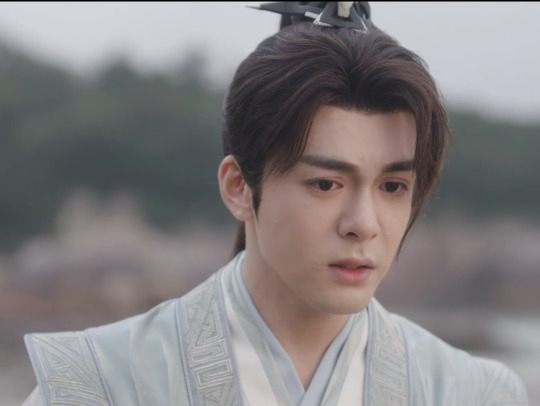

(On the left is the outfit in episode 40 after reading Li Lianhua's letter. On the right is the outfit in the special episode when he and Di Feisheng show up on the donghai beach to look for him 3 months later.)
While we're on the subject of costumes, @the-surreptitious-albatross and I just realized how different this outfit of Fang Duobing's is from his earlier outfits.
Here are some examples of a normal FDB outfit:
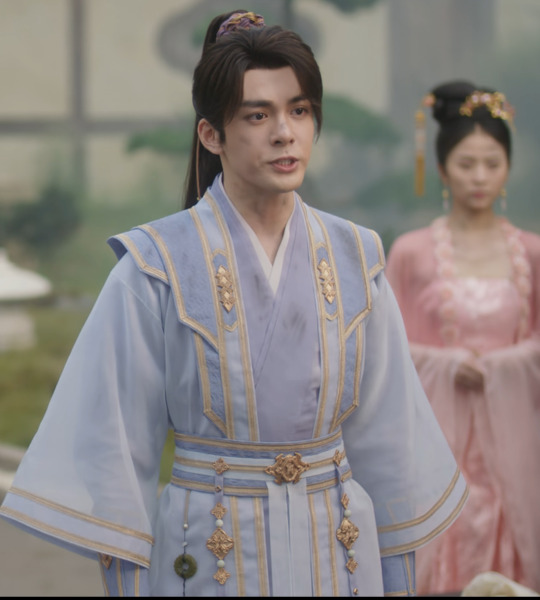
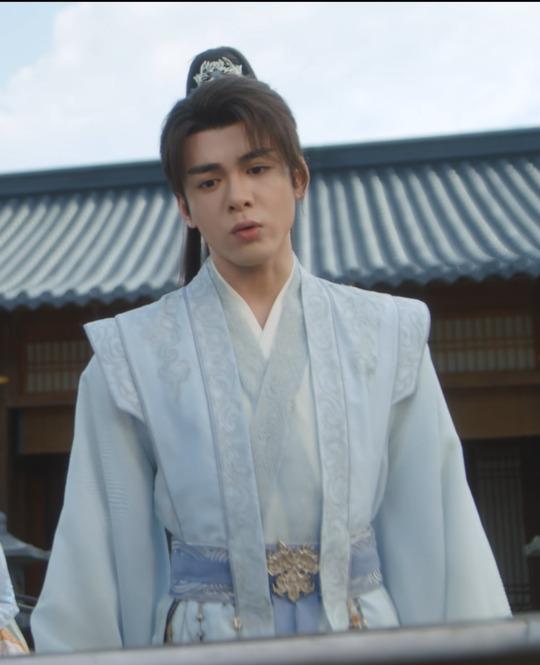
He prefers pastels, and his belts and wrist guards are often the same color as the pastel or a slightly darker version (and here, they have gold decorations).
Zooming in shows that he prefers his embroidery designs to be swirly and his hair accessories to be braided and color-matched or elaborate and silver (but still on the delicate side).

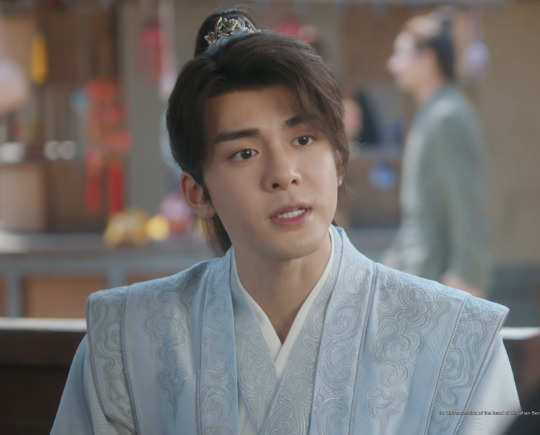
But check out this outfit: the embroidery is more angular and less swirly, as is the hair piece, and it and the belt and wrist guards are black with silver instead of matching the pastel of his outfit or being a slightly darker shade of it.


You know whose style he's echoing with all these changes? Who else tends to favor black wrist guards and belts with more angular designs?
Di Feisheng.
The images below make it a bit clearer: DFS's belt has gold decorations compared FDB's silver, and the shape is different, but you can see the similarities in the wrist guard design in particular.


It's not obvious how much their costumes are tying them together in this scene because we don't ever see them in the same frame; the camera constantly keeps them apart, as does the blocking of the scene, since DFS is on the rocks and FDB is on the beach.
That changes in the special episode when they both arrive on the beach at the same time, and DFS is wear his sect leader robes.

Here they are, in the same frame at last, and side by side, and you can see even more clearly with this DFS outfit how much the style of FDB's belt, wrist guards, and hair accessory is echoing his. The wrist guard pattern looks almost the same in these pictures! And the cut of the outer sleeveless robe is also very similar, which visually pairs them even more.
All this to say, FDB's clothing style shifts, the gentle swirls sharpened into points by his worry and grief for Li Lianhua, and it breaks my heart.
But the fact that he's visually echoing Di Feisheng now, that they're slowly becoming a matched set, is starting to put the pieces back together again.
#mysterious lotus casebook#mlc meta#Fang Duobing#Di Feisheng#Li Lianhua#costume meta#lhl#I really meant to write more of my fic today#and instead this happened#thanks the-surreptitious-albatross!#Difang#difanghua
198 notes
·
View notes
Text
on twitter here and here, forayuarchive has been talking about how LLH & FDB really act like an old married couple, and i couldn't stop thinking about it too. as a native chinese speaker, the level of informality, familiarity and bickering, in how FDB and LLH speak to one another (especially in the later episodes) are reminiscent of how bickering old married chinese couples are often depicted.
when FDB is angry/upset at LLH, he calls him "死莲花" - "Damn Lotus/Damn Lianhua". the way FDB says it is in a manner where you might imagine old spouses scolding one another when nagging/bickering (to clarify, it's not romantic per se, but it's extremely informal & familiar).
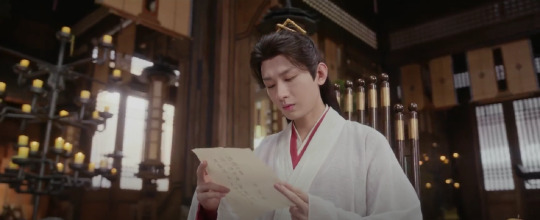
for example, in ep 35, FDB calls him Damn Lotus in the note he left LLH when he went to look for the styx flower. CN fanghua fans on weibo managed to painstakingly transcribe the note (see forayuarchive's tweet about it here with the eng translation) - it's extremely informal and reads like a short note a spouse/partner would write when leaving their shared home in a hurry.
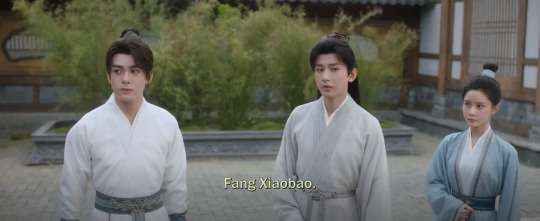
i also still can't believe LLH calls FDB "xiaobao", it speaks for itself. 小宝 Xiao Bao (literal meaning is "little treasure") is usually something you call literal babies/children AND is FDB's family nickname for him so if you're calling a grown man that in front of his parents and his colleagues and strangers and literally everyone, then he's either your biological family or he's your bf/partner. (it's a level of intimacy that would make me feel embarrassed as a third party hearing LLH call FDB that in front of everyone😭)

and not to mention the deleted line of FDB calling a sick/unconscious LLH "xiaohua'er". (see video & meta of the deleted line by forayuarchive here, translation of the deleted line by ttiesanjiao here). xiaohua'er is so intimate, definitely something one might call a lover 😭
(*for more name meta, see forayuarchive's twitter thread meta about all the names that FDB and LLH call one another, and in what situations each particular name is used)
in any case these are NOT what a disciple calls his shifu or a son calls his dad. these nicknames are far too informal and familiar - no son talks to his father like that and no disciple talks to his shifu like that. (now, an angry spouse however...)
(there's also the fact that FDB explicitly rejects their relationship as being anything other than that between 2 adult equals - when LLH jokes that FDB should bow to him as disciple, FDB immediately rejects the idea, saying that he was only joking about wanting to be LLH's disciple, that FDB is too old now. he firmly sees himself as an adult equal to LLH.)
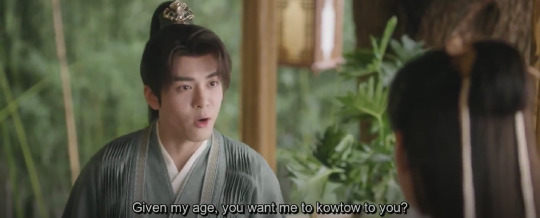
tl;dr within months of knowing each other, LLH & FDB act as familiar as an old couple 10 years married, skipping the entire courtship stage 😭
#fanghua#mysterious lotus casebook#fang duobing#li lianhua#莲花楼#mlc meta#there's more to say about the names they use for each other but this post is alr getting long#sometimes i see ppl saying that LLH and FDB are like dad and son and um... well you can all interpret anything you want#im just saying that as a native chinese speaker the way they talk to each other is NOT shifu & disciple at all#(UNLESS IT'S THE MO RAN AND CHU WANNING KIND OF DISCIPLE AND SHIFU/SHIZUN)#its even less son & dad😭😭 (v much NOT son & parent dynamic like omfg even if a child and parent were v close they would NEVER talk to#their parent like that in chinese culture. NEVER. bc it'd be so rude that at that point ur rejecting ur dad if u call him like that)#(as in straight up not seeing that person as ur dad at all. rejecting them as a parent entirely)#(bc FDB does NOT see LLH as anything other than an equal)#compare FDB & his mom - he is v close to her. he is playful with her but still always calls her Niang ('mother')#edited the post several times im so sorry for how many times i edited this
271 notes
·
View notes
Text
in a drama that pays SO much attention to and is deliberate about giving each character a very distinct silhouette, it has been driving me absolutely fucking insane for several weeks now that some of jiao liqiao's outfits are cut like li xiangyi and li lianhua's robes.

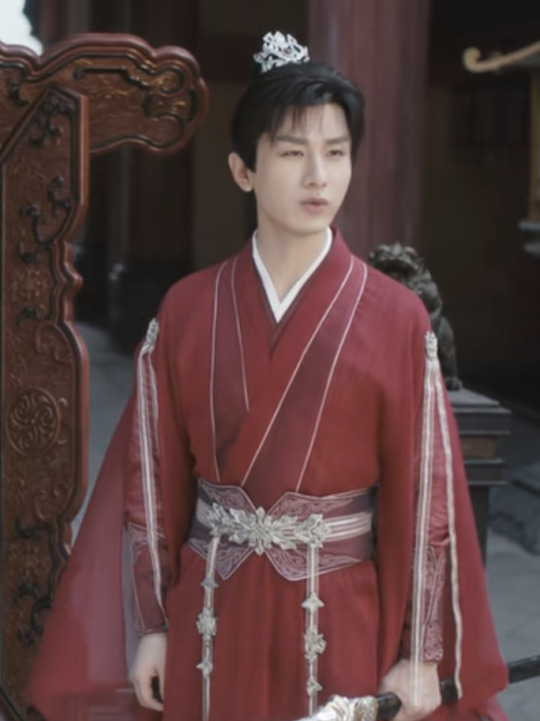
you can see the visual similarities between jiao liqiao's most-worn outfit and li xiangyi in the general form of the robes, but particularly in the drape of the sleeves and where they fall open at the shoulders (sorry, i don't know the technical term). it's harder to see here but both outfits also have bracers that match the robes in a very integrated way and colour-wise, with the same fitting to the sleeves.


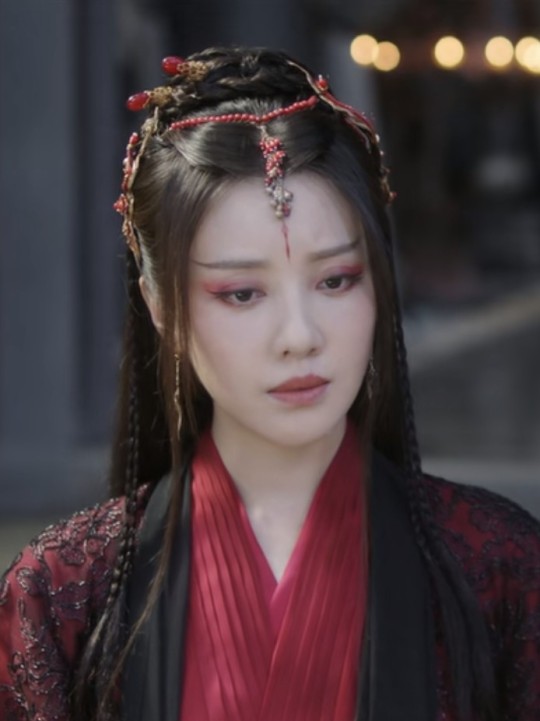

here, if not for the colours and material of jiao liqiao's outer layer, this would be something li lianhua would wear. the fit of these robes are the same. the pleats at the lapels even match. jiao liqiao is visually paralleled with li xiangyi and li lianhua, mirroring the man she's forever seen as competition for di feisheng. it's as though in truly every way, she's trying to replace him. maybe if she tries hard enough, di feisheng will finally look at her for once.
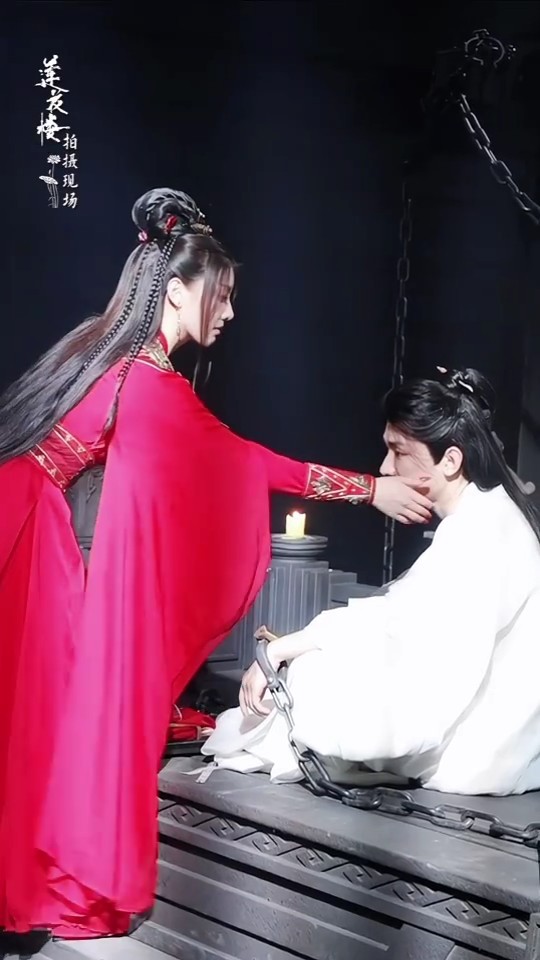
i mean hell, think about how even more interesting this scene gets— jiao liqiao's "i'm the victor in this game of love" moment— once you realize she's taunting li lianhua about having a place beside di feisheng while emulating the image of li xiangyi, the man di feisheng cannot leave behind. ("maybe you could still have had him now if you'd stayed like this. if you hadn't become what you are now. it's too bad i stepped in all those years ago, and so you're in this state, isn't it? i've won, li xiangyi.") mysterious lotus casebook already did a stellar job in everything else in establishing jiao liqiao and li lianhua as rivals for di feisheng, but this visual aspect just elevates some of these character interactions throughout the show.
#the way i described jlq's lxy robes at first was ''lxy but if you added more wedding gold to them''#i haven't been normal since#sorry ive been too lazy to look for screenshots before but I didn't want to post about this without them#rewatch has proved so fruitful to me#mysterious lotus casebook#jiao liqiao#li xiangyi#ashton originals#mlc meta#mlc costume meta
191 notes
·
View notes
Text
The women in Mysterious Lotus Casebook
Normally I feel like I have to turn off my feminism brain for some of these shows, but I was beyond pleasantly surprised at how deftly the main female characters in MLC were handled...
Qiao Wanmian: The perfect set-up for a female character only brought in to serve the main male character's emotional arc (usually by getting fridged), but she... gets her shit together, takes over the sect, and becomes a boss ass bitch?? SLAY. She respects both Li Lianhua and herself enough to recognize it's never going to happen between them and she needs to live her life on her terms. She also realizes Ye Baiyi Xiao Zijin is a piece of trash and she deserves better. -1 for excessive teary pining for Li Xiangyi, though tbh I can relate, because I too will be obsessively and excessively crying over Li Lianhua for 10+ years. Embarassing for both of us. Still, 14/10 for a self-respecting lady
Master He: THE mom of all time. Teases Fang Duobing for his obessesion with his boyfriend Li Lianhua. Pulls the "I'm not your biological mom but I raised you, bitch" shit and it works. Steps in, fists raised, whenever her son needs help in a fight. Loves torture devices. Meanwhile, you keep forgetting if Fang Duobing's dad is dead or if he's just on the couch playing duolingo like the dad in Barbie. But it's fine because mom carries the whole fam + family business anyway. 16/10 milf
The princess: Seemed more pissed than heartbroken that Fang Duobing ran away from their marriage, which neatly avoids the "spurned woman" trope. Is so freaking cute I wanna squish her cheeks. Acts like a realistic pouty teen but also wields her princess power like it's nobody's business. Understands Fang Duobing's desires at the end and respects them both enough to let him follow his heart. 15/10 would adopt
Jiao Liqiao: Batshit psycho. I love her. Unhinged and horny on main. Infinity/10
#mysterious lotus casebook#mlc meta#(sort of lol)#qiao wanmian#princess qian qian#jiao liqiao#he qiaohui#master he#fang duobing#li xiangyi
260 notes
·
View notes
Text
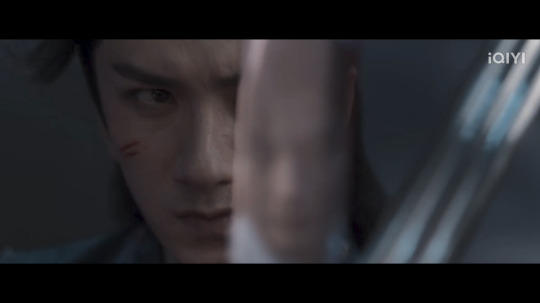
Still feeling insane about this shot. "Checking you out between the crossed blades of our swords" yes good but Li Xiangyi is literally seeing his own face in Di Feisheng's sword as it obscures half of DFS's face. If swords and swordplay are the truest expression of - god how do I even describe it - who you are, your core, your relationship to the world and how you act within it, your morals, your standards, your beliefs idk just EVERYTHING - And here is the only other person who can match you, your rival and your enemy and your equal - crossing blades with you, because you think he's betrayed you, killed your shixiong, torn up the peace treaty you created together - but in his blade you see yourself.
The show is telling us literally in the opening scene that these two people are a matched set, do not separate - even as the scene is tearing them apart.
#*screaming into my fist*#feihua#di feisheng#li lianhua#li xiangyi#mlc meta#mysterious lotus casebook meta#mysterious lotus casebook#mlc episode 1
193 notes
·
View notes
Text
Mysterious Lotus Casebook and the Analogies to Being Queer
this is not breaking new grounds or anything, there seems to be broad consensus in the (tumblr) fandom that LHL is a lot about being queer. there is also this brilliant meta by @seventh-fantasy about the jianghu being a queer space, which i love, and which dealt with the gender perspective for li lianhua in particular
having that in mind, i want to say how much i love that li lianhua and fang duobing's stories feel like analogies to two different queer experiences
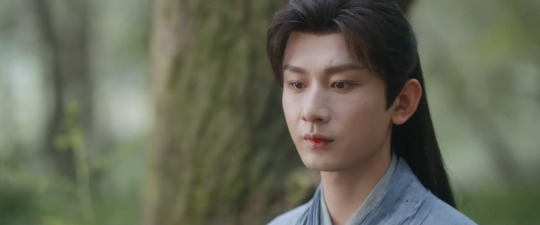
we see li xiangyi in a few flashbacks and in how others viewed him before the east sea battle 10 years ago. we know he became the n°1 swordsman in the world, established a para-judiciary system and order in an otherwise lawless jianghu, that he used to duel just to win the right to pick flowers from someone's garden as gifts for every single lady in the sigu sect, and that he dated qiao wanmian and intended to marry her (judging by that flashback where he's seen drinking with shan gudao and the boys)
a lot of it is very heteronormative, and even a bit performative. and i don't want to say it's not genuine, i actually rly like the idea that many of those actions felt perfectly real to him at the time, and i genuinely think he had that show-off streak in him when he was a teenager
but regardless, everything about li xiangyi follows the heteronormative expectations of society, including his achievements, which command, among other things, admiration for his fighting prowess and his ability to establish rules. which is of course, ironic, as pointed out in the meta referenced above, since the jianghu itself does not follow those rules (and we slowly learn in the story that there was criticism of him for this even in-story).
but then we get to li lianhua, who does not fight, but cooks, learned to sew, to plant flowers, turns down every lady who looks his way, and who does not interfere in jiang hu matters if he can help it. and in particular, we get the conversation he has with qiao wanmian in ep 18, where she confronts him about his identity and asks him:
"if you'd already come back, why did you never reunite with us?"
and his reply is:
"all of this is so far in the past, now. i'm very tired. i just want to be free."
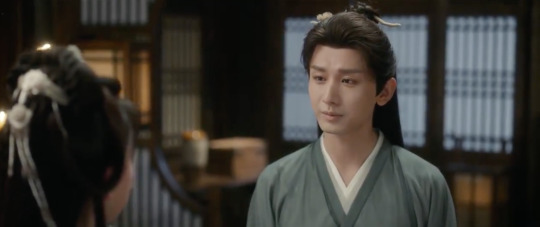
li lianhua is constantly put in contrast with li xiangyi. where li xiangyi performs, li lianhua just exists in the jianghu. where li xiangyi fulfils expectations and surpasses them, li lianhua turns his back to expectations. where li xiangyi establishes a domain and protects, li lianhua wanders freely, all by himself. where li xiangyi conforms to heteronormative standards, li lianhua doesn't.
we know that li lianhua is an unreliable narrator in that his opinion on his own past is biased, his knowledge incomplete. and he lies. almost compulsively. but there are also truth bombs that he drops between the lies. i personally believe that his willingness to detach himself from all the expectations thrown upon him and to finally exist away from norms, is part of those truths.
and this is very close to a type of queer experience, where you come out of some event or another in your twenties, suddenly realise you're queer and oh my god, it's time to live differently. and you start rejecting the norms and maybe your old friends wonder what got into you.
in the same conversation in ep 18, the following exchange happens between li lianhua and qiao wanmian:
LLH: "when we met each other, I was young and ignorant. I didn't understand what the feelings i felt for you were, either."
QWM: "what do you mean? are you saying... you never loved me?"
LLH: "back then, we were young. nothing of what we said then can still count now."
it can be interpreted in different ways, but it sure fits a queer narrative extremely well. the feelings were real, but he didn't understand whether they were romantic or not, he just followed the norms. but things are different now.
enters fang duobing
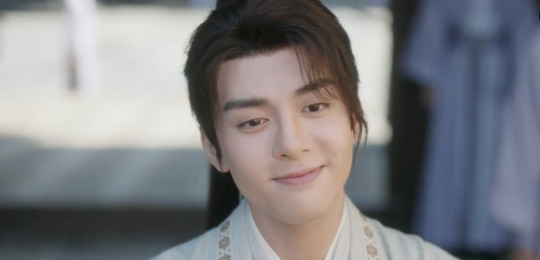
fang duobing feels like a different queer narrative. by family background, fang duobing is a person who has equal ties to the imperial court as he does to the jiang hu. the emperor and his family wants to engage him to the princess of the court, a perfectly normal thing in the societal context he lives in, and a luck few can hope to have. what does he do?
flee
i often joke that fang duobing's sexuality is to be a detective on the jianghu, but it really does feel like that kind of narrative. fang duobing never has any doubt that his place is away from the rules of the imperial court. In ep. 1, he tells his servants:
don't worry. once your young master makes a name for himself as a renown detective on the jianghu, they {his parents} will understand that, compared to the imperial court, i am much more suited for the jiang hu.
and yes, this is about escaping the rigidity of the court as such, but it's also analogous for the freedom to be who you are, to be queer, to not conform.
and fang duobing never backtracks. his parents want him to conform, and they want him to have the comfort that comes with this lifestyle. he rejects it thoroughly and consistently.
it's also interesting that in ep 25, once they meet the princess and they have gone through a case together, fang duobing still rejects the idea of the wedding. when li lianhua tells him "the jianghu is a place full of grudges and sinister schemes. why not become a carefree consort prince?"

fang duobing only looks forlorn and retorts "li lianhua, can you never say that again, please?"
in contrast, though, he has no qualms planning his whole life on the jianghu with li lianhua in ep. 15. so this is not about settling down with someone.
it feels very close to being confidently queer and knowing it from a very early age, and then rejecting the heteronormative expectations thrown upon you with assurance.
...
anyway, so what i want to say is: li lianhua is a tired millenial who discovered he was queer in his mid-twenties after a mild depression; fang duobing is a gen-z baby queer who doesn't know his queer history but is so confidently queer and he's never looking back
112 notes
·
View notes
Text
Wen as Observer in Moonlight Chicken
Something that really stood out to me on this rewatch of Moonlight Chicken is that Wen is always looking. He's always watching, very intently, and with so much yearning and vulnerability.
I remember being struck by Wen's eyes the first time I saw Moonlight Chicken, but on rewatch I realized it's because he's always looking. Unwavering. The camera is always watching Wen and Wen is always watching others. We are introduced to Wen with an extended shot of him gazing at Jim and Jim gazing back, and from that moment on, Wen does not stop looking.
Wen acts as the audience's surrogate in a lot of ways. He's new to the chicken diner ensemble, he's an outsider, he meets the rest of the characters along with us. The emphasis on Wen watching the other characters also underlines how Wen can be read as the point of view character, though not the main character (to the extent that the show has a single main character, which as an ensemble it doesn't really but Jim is the cornerstone for all the other characters). Because of this, there's a lot we don't get to know about Wen, a lot of the details of his life before coming to Pattaya and meeting Jim are vague, but we get to see a lot about the other characters through Wen's eyes.
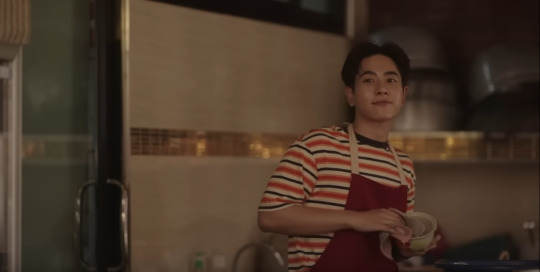
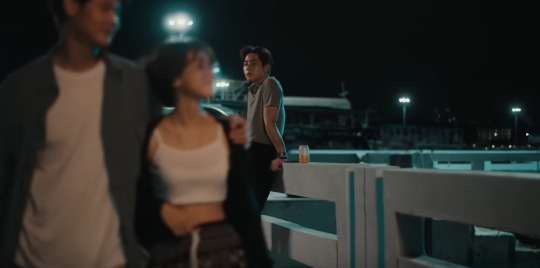
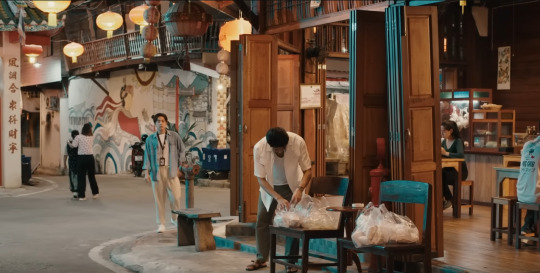

Wen is often placed on the outside, watching. He is sometimes physically separated from the rest of the chicken diner family, looking on from a distance when he's with his other coworkers or watching while cleaning from the other side of the diner as Jim talks to Gaipa or Saleng. He's isolated, separate from the group, an intruder even. He wants community, a home, but also doesn't feel like he can have it yet, due to his job, due to Alan, and so he has his own walls up, casting himself as observer.
But the moments that really stick out to me are when he's looking at them close up, while sitting with them, or in Jim's case, often about two inches from his face. He's so blatant about it. But no matter how close he is to them, for a long time Wen still feels like an outsider looking in, wanting to be part of it but often just on the edges. There's a lot of loneliness and longing in these glances, wanting to see but also wanting to be seen in return. Wen asks Jim outright, teasing, "Can't I look at you?" but Jim just smiles and looks away.

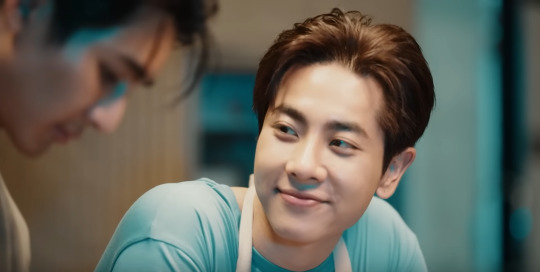
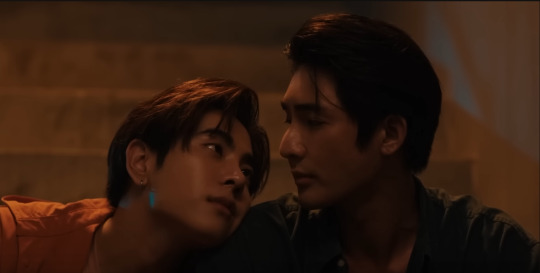

Because he has that outside perspective, Wen's the first one to know about Li Ming and Heart, seeing them together in the food court and instantly recognizing their connection. He takes a photo of the two of them when they ask, highlighting his role as observer, acting as the camera lens. He doesn't tell Jim about seeing them together, and when Jim asks, he tells Jim he needs to pay more attention and listen more. Jim is too close to the situation to fully recognize what is happening, what his nephew is going through, but Wen notices.
Wen is always looking at Jim, and at the rest of Jim's (found) family, which is starkly contrasted by how he acts around Alan. The first time Alan is introduced, Wen can barely hold his eyes for most of the scene. The tables have turned and now Alan is the one looking, searching for the connection that has been lost. Looking back would reveal too much vulnerability for Wen, the love that isn't there anymore, and the guilt he feels. Until Wen gets mad, and then he locks eye contact. By the end of the show, however, as their relationship starts to heal and they are able to maybe actually be friends, they both look at each other more, without the intensity of before, but with comfort and familiarity.
Jim avoids long periods eye contact with Wen for much of the show, and though he looks back at Wen, he often quickly glances away. He can't look at Wen for too long because he has put up so many barriers between the two of them, not letting him get close. The way that Wen looks at Jim is completely open and inviting, begging him to look back, which Jim doesn't let himself do until the last few episodes. Gong warns Wen to just not make eye contact in order to avoid any emotional intimacy, but throughout the show we see that Wen is physically incapable of that. Wen doesn't want to put up those barriers between himself and others, and especially Jim, in just the same way that Jim is desperately clinging to those walls to protect himself, not ready for another love that might destroy him.
It isn't until the end, when Jim starts to open up and let Wen into his life, that Jim consistently looks back. Before this, it often became painful to see Wen looking so intently at Jim, putting it all out there, but not being fully seen in return, reciprocated. But they both desperately want to look. They're both lonely, even when surrounded by people, but they're unable to let each other in or be let in. There's so much yearning for that closeness, on both of their parts. They just need to be vulnerable and look back.
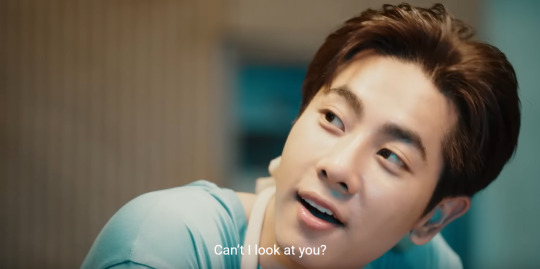
#moonlight chicken#mix sahaphap#this post got too long but it can't be helped#wen's eyes have bewitched me body and soul#moonlight chicken meta#thinking thoughts#mlc meta#wen mlc#jimwen#earthmix#wen 👀
174 notes
·
View notes
Text
Moonlight Chicken is about moving on, about finding community, about learning to love, about learning to let go, about realizing you were never alone, about trusting in love, abut overcoming your internalized prejudices, about the power of relationships (romantic, platonic and familial) and how they are shaped in day and in night and in life and in death and in loss and in gain and in change and in choices, it's about your family and it's about what family means and it's about loving with your whole heart and smashing down your walls and opening up even when you know you might get hurt again.
#moonlight chicken the series#moonlight chicken meta#moonlight chicken#thaibl#thai bl#bl series#thai drama#thai series#bl drama#gmmtv#thai bl series#thai bl drama#thai ql#ql drama#ql series#themes#mlc#mlcts#mlc meta#the themes are so good
319 notes
·
View notes
Text
I know it has already been said many times but Jim and Li Ming being mirrors of each other makes me feel utterly insane. Like I think Jim looks at li ming and can only see himself as a younger man, hotheaded and emotional and driven by love, and he wants so so badly for li ming to not become him bc deep down he doesn't think his life filled with pain and regret and loneliness is one worth living ("I'm not fit to be anyone's home" you get what I'm saying!!!)
But setting aside the fact that Li Ming is his own person with his own path to walk and his own lessons to learn, he is also a person who cares fully and deeply about the people around him, who strives to create community and help the people he loves feel like they have a place where they belong and is GOOD at it, and i think it's obvious where he learned that from, coming of age as he has in Jim's diner. It fucking kills me that Jim can't seem to fully see the value of that, both in Li Ming and himself.
#moonlight chicken#giving me mad mother daughter vibes and li ming isn't even his child dgdkdhdhd#but also he is!!! he is!!!!!!!!!#sarah.txt#mlc meta#story meta
188 notes
·
View notes
Text
I've definitely said this somewhere but:
If Li Xiangyi was the sun (blinding, bright, golden, full of light and life but painful to look at for too long, unattainable) then Li Lianhua was the moon (still bright but you can look at it for a very long time, always changing and impossible to pin down, scarred and damaged visibly but all the more beautiful for it, seemingly less remarkable and softer than the sun so it deludes you into thinking you can reach out and touch it but in the end it's still as unattainable and unreachable as the sun).
#li lianhua#mysterious lotus casebook#lian hua lou#li xiangyi#Mlc meta#Gotta love a man who can do both#Breaking news: your blorbo has achieved duality#(he is both sun and moon coded)
72 notes
·
View notes
Text
Mysterious Lotus Casebook and Complex PTSD Representations: Part I
One of my favorite things about Mysterious Lotus Casebook is how surprisingly nuanced and unusual its portrayal of complex PTSD is. So many shows either introduce character trauma to make the character Sad and Brooding, Angry and Violent (if they’re a villain) or Hesitant to Start a Relationship (if it’s a romance), and that’s usually as in-depth as it gets. If they address the unique after effects of child abuse that lead to complex PTSD at all, it’s usually either explain why a character is a homicidal monster (which is all sorts of problematic) or it’s limited to a single phobia, which can be overcome by the Power of Love, or it’s just something that crops up occasionally for Plot and then forgotten about the rest of the time.
Mysterious Lotus Casebook gives us two deeply traumatized characters–Li Lianhua and Di Feisheng–who each have clear symptoms of complex PTSD, and yet, their cPTSD manifests completely differently because of the types of traumas that caused it and their relationships to the people causing the traumas. And their manifestations of cPTSD affect just about every level of their being, including their sense of self, their decision-making, and their relationships with others, and it includes some of the incredibly important manifestations of cPTSD that are almost never shown in media while avoiding the most insulting stereotypes!
PTSD vs cPTSD
Post Traumatic Stress Disorder is an anxiety disorder caused by experiencing a single (or short lived) traumatic event (an accident, assault, medical emergency, fighting in a war, etc), where the symptoms last for longer than a month. Symptoms include things like reexperiencing the event (flashbacks), avoidance (of things related to the event), changes in mood (depression, anger, fear, etc), and issues with emotional regulation (hypervigilance–being constantly on the lookout for threats–irritability/angry outbursts, etc.).
Complex PTSD happens if someone has experienced long term, chronic/repeated trauma that induces hopelessness and no chance of escape (survivors of extended child abuse, human trafficking, domestic violence, prisoners of war, slavery, etc.). It’s also often interpersonal in ways a car crash or medical emergency is not, and is particularly linked with chronic trauma during childhood: chronic stress hormones introduce literal physical changes in a growing brain, particularly the amygdala (which processes fear), hippocampus (which is responsible for learning/memory), and the prefrontal cortex (which is responsible for executive function), so it can affect every aspect of life and also affect a child’s progression through developmental stages. In addition to these physical changes to the brain, the prolonged trauma–particularly the helplessness–distorts a child’s sense of self, the perpetrator, and the world in ways that alter their decision making, their memory, and their future relationships.
For instance, whereas a traumatic event that caused PTSD might make you depressed or not trust the person who harmed you (or to fear driving), the trauma from cPTSD might make you suicidal, blame yourself for your victimization, decide to isolate to avoid interpersonal relationships to keep from getting hurt, or become obsessed with never being harmed again.
Basically, cPTSD has the core symptoms from PTSD with some extra challenges, including issues with emotional regulation, self-concept, interruptions in consciousness, difficulties with relationships, perceptions of the perpetrator, and systems of meaning.
DFS and LLH: CPTSD Symptoms
There’s so much more to say about this than I can cover in this superficial introduction, so this will be the first of a series of metas; I’m hoping to go into more depth about some of these categories in future posts (the DFS and emotional regulation/violence one is already drafted, so stay tuned).
Difficulties with Relationships (problems with trust, communication, missing red flags): Both DFS and LLH have a history of trusting the wrong people and not trusting the right people, both in the past and in the present of the show: in the past, LLH missed the fact that SGD hated him and DFS missed the fact that JLQ was obsessed with him, and as a result, both sects were destroyed, many people died, and the two almost destroyed each other. If they had communicated with each other instead of fighting at the donghai battle, they might have realized they were being set up and could have worked together, but their difficulties with trust after perceived betrayal made that impossible for them. They both have a history of overlooking red flags in the present–DFS in particular, keeping the red-flag-personified-JLQ around despite her history of poisoning people, including himself–and they both tend to struggle with relationships in the present: LLH runs away from and/or drugs the people who care about him, and DFS sends endless mixed messages by not telling Li Lianhua most of his plans to help him.
Self-Concept (Self-hatred and self-fragmentation): Li Lianhua is basically the poster child for having a negative self concept: he has an overdeveloped sense of self-blame and responsibility, even believing he deserves to die for leading his men to their deaths, and once he learns he was manipulated and SGD was behind it all, he seems to think it’s his own fault that he was manipulated, lied to, and abused. His self-loathing is so extreme that he imagines his earlier self, Li Xiangyi, to have died, and tries as much as possible to be nothing like that earlier persona. His repeated insistence that Li Xiangyi and Li Lianhua are NOT the same person is reminiscent of the fragmentary sense of self that comes with more extreme trauma, like Dissociative Identity Disorder (DID) or Other-Specified Dissociative Disorder (OSDD), where traumatic experiences are so painful that people form different alters, or differentiated self-states, that can have different names and skills and memories and identities.
Di Feisheng doesn’t have the self-hatred or guilt that LLH does, and it seems like he tries to skip over questions of self worth, blame, or hatred by focusing exclusively on staying true to his code of ethics he’s developed for himself and focusing on gaining the strength necessary to fight for his freedom from mind control and the Di Fortress. But even though he’s kept his Di name, kept his goals the same since escaping Di Fortress, and hasn’t tried to separate himself from his trauma the way LLH did with LXY, he’s even more willing than LLH to take on different identities: it’s literally one of his martial arts skills. The Bone Constriction Skill lets him become someone else for a time, whether that’s a child or Shi Hun. It fits well with his willingness to be whoever he needs to be to accomplish his goals: he’s perfectly willing to be seen as a heartless villain if it lets him protect LLH, and he’s willing to flirt with and pretend to be jealous of JLQ to get information from her, and he’s willing to be LLH’s a-Fei, both with and without his memories.
Interruptions in Consciousness (Amnesia and nightmares for Everyone): LLH and DFS both have nightmares and flashbacks/memories of traumatic events, and as mentioned above, both have interesting hints of having fragmented/fluid senses of self. They both also dissociate, or separate themselves from the present when dealing with traumatic things: LLH spaces out and gets stuck in his past memories about SGD when talking to FDB after burying SGD, and DFS dissociates from physical pain so as not to make noise both after he’s been stabbed and poisoned with Wuxin Huai and again when JLQ is torturing him in her water dungeon.
They both also have dissociative amnesia that takes away trauma memories, although one is from a poisonous incense plus the magic of qi macgyvering: LLH forgot the existence of his older brother who died in front of him, and DFS as a-Fei had just about all of his memories (except a few of killing as a child) taken away. Amnesia is a huge part of cPTSD, because it’s the brain’s way of trying to protect you from truths that you might not survive. It can manifest as blocking out one single traumatic event, a bunch of thematically or temporally linked traumatic events, a skill set related to the trauma, or, in the case of something like DID or OSDD, just about everything. It’s endlessly fascinating to me that the show gives us one example of definite traumatic amnesia through LLH, and then seems to almost transform the experience of having DID and being a new part and finding yourself with a new name and very little else into an exaggerated fantasy setting (interestingly, people often report experiencing debilitating headaches when they try to regain memories behind the amnesia barrier). I doubt this is what they were actually going for, since DID is almost universally portrayed incorrectly and offensively in media (one of the alters is almost always portrayed as a serial killer, but that’s a rant for another day), but the different names and the presence of amnesia with LLH made it a fascinating enough parallel that I had to mention it.
Problems with Emotional Regulation (Lashing in vs. lashing out): Li Xiangyi and Di Feisheng are polar opposites when it comes to struggles with emotional regulation: whereas LXY turns his anger inward, directing it all toward self-hate in what’s often called a “toxic shame spiral,” both after the donghai battle and after he finds out about SGD’s role in his shifu’s death, DFS lashes out physically at those who have harmed him, usually via choking people, although he is usually exerting an impressive amount of control over his emotions and strength. To put in perspective just how different their emotional strategies are and how much effort DFS puts into emotional regulation, compare how much more calm he is than LLH during any revelation of past betrayal or painful information, any scene where they confront the people who have abused them, or any scene where they learn they’ve been wrong about something big; LLH is most likely having an emotional flashback (re-experiencing the emotions from the earlier traumas) and DFS is probably compartmentalizing them or dissociating from them to process later/never so he can stay semi-functional and not show a potential opponent a weak spot.
NOTE: This means that DFS is loooong overdue for a very dramatic breakdown when it eventually all catches up to him and he can’t distract himself from it anymore.
Perceptions of Perpetrators: In this way only, Di Feisheng has one advantage: he knows the head of Di Fortress is a cruel, abusive tyrant. While he clearly still fears him, even as a physically strong adult (he has nightmares, flashbacks, and dedicates his life to being free from him, which means he still to some extent feels young, small, and helpless when he thinks of him), DFS knows that he hates him and wants to be free of him. This is probably part of why he’s spared some of the self-hatred LLH experiences: he knows he didn’t deserve the abuse because seeing it happen to other children means he knows the abuse wasn’t a personal reflection on him. It does, however, motivate him to want to be stronger and invulnerable so as to never be helpless again, and that obsession is what drives him to have a single-minded focus on reaching the pinnacle of the jianghu.
It’s so much more complicated for Li Lianhua (and for a more detailed analysis, check out this meta): the childhood perpetrators were manifold–a slew of bandits, whichever children and adults on the street would abuse him for existing and being poor–it probably felt like life itself was to blame. It’s no wonder that when his shifu and shiniang took him in, they were the ultimate rescuers whom he hero-worshipped, so when he felt he made a mistake and his life fell apart, he blamed himself: at least there would be someone to blame that way and something he could do about it (try to kill his past self and hate everything about him). It’s also very telling that LLH doesn’t blame JLQ or YBQ all that much when he learns they poisoned him, and that he’s more angry that SGD murdered their shifu than he is that SGD set him up, hated him, and was the real mastermind behind everything he had blamed himself for; he struggles to stay angry at people who harm him, and would rather blame and hate himself for being tricked than hate the person who tricked him. So, whereas DFS tries to destroy the people who abused him, LLH tries to destroy himself.
If you read this far, thanks! I’m probably going to be posting the DFS and emotional regulation/violence against perpetrator meta next, because it’s drafted, but if there are any of these you desperately want me to talk about more sooner rather than later, let me know! :D
#mysterious lotus casebook#mlc meta#di feisheng#li lianhua#Li Xiangyi#complex PTSD#child abuse#sorry it's so long! This is the short version#The original version was 2700 words#dissociation#trauma#I am so here for non-monolithic representations of mental illnesses#PTSD#In case you can't tell I am very invested in depictions of PTSD and cPTSD#I'm always up for talking about fictional portrayals of trauma#so feel free to message if you have questions about any of this and don't want it to be in the notes for some reason
128 notes
·
View notes
Text
Not father & son, not master & disciple, but a secret third thing
First of all, let me preface this by being clear that everyone is free to headcanon anything they want and like/dislike anything they like/dislike! That being said, sometimes I see international fans interpret FDB as LLH's son, or their dynamic as parent-child or otherwise familial, and as a native chinese speaker, I just wanted to share some reasons why I personally did not interpret them as familial.
Granted, at the start of the show, FDB is kept in the dark and also not up to LLH's level of skill in solving cases. However, FDB quickly catches up in crime-solving skills, intellect and maturity by the 2nd half of the show, after a well-written growth arc. I think the beauty of the characters and relationships in this show is that they grow & evolve, and are meant to do so. The dynamic that LLH & FDB had in episode 1 is quite different from their dynamic at the end of the show. By the later episodes, they are 2 adults who are very much equals.
Why I don't read them as father & son:
LLH & FDB act and speak in a manner that is far too informal & familiar with one another, which would be extremely inappropriate for any kind of parent & child, even a surrogate one. Several times, FDB calls LLH by just his first name "Lianhua", and sometimes even calls him "Damn Lianhua" when he is angry/upset at LLH. This would be extremely rude for a disciple to call a master, or a son to call a father. No son talks to his father the way FDB talks to LLH, and no disciple talks to their master like that. Unless the son/disciple hates the father/master, and is outright rejecting his father/master altogether. As we see in the show, not only does FDB not hate LLH at all, he instead cares deeply for LLH and would do anything to save him. Why, then would someone scold/curse someone they care about? Does the trope of the upset spouse/partner sound familiar?
For comparison, see FDB's interactions with He Xiaohui, who he is close to - he is informal & affectionate with her, but never calls her anything other than "娘 niang" ("mother"). I can't emphasize enough how taboo it is in Chinese culture to ever call your parent or parental figure by their name under any circumstance.
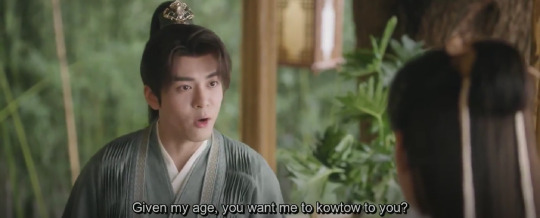
2. In ep 31, FDB himself explicitly rejects the idea of LLH as his shifu and himself as LLH's disciple, responding that he is too old to be LLH's disciple and it was merely a joke. He clearly sees LLH as an equal, and rejects the notion of their relationship being anything other than that of 2 adult equals. LLH also tells his shiniang that FDB is not his disciple, and a few episodes ago LLH told FDB that he has never understimated FDB.
Coding/hints as something other than platonic:
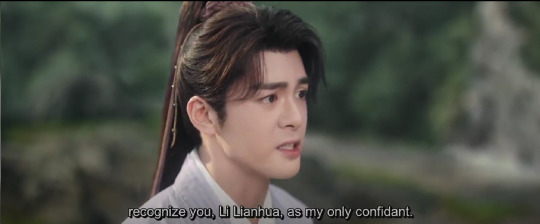
Zhiji/zhijiao - FDB calls LLH his 知交 zhijiao in ep 19, and 知己 zhiji in ep 34. "In this life, I, Fang Duobing, recognize you as my only zhiji." is practically a love declaration. And this bond is reciprocated by LLH, bc in a deleted line in ep 19, translated by forayuarchive on twitter, LLH is the one who first calls FDB his zhijiao.
To clarify, Zhiji is not specifically a romantic term, but it's what was used in both The Untamed and Word of Honor - both dramas based on danmei novels with canon gay main pairings - to bypass censorship, to code the bond between the main duo as deeper than your typical platonic male friendship. (See this post for a detailed explanation of the significance/history behind the term zhiji, and see this twitter thread for an explanation of the meaning of zhijiao in MLC - especially how zhijiao is specifically mutual, reciprocated).

2. Married bickering - forayuarchive on twitter has discussed in these twitter threads how the tone of many of LLH & FDB's interactions (especially FDB) is similar to how married couples or romantic partners speak to one another bc of the level of familiarity, tone and language. For my fav example, see this note (translation by forayuarchive) that FDB left LLH in ep 35, which reads pretty much like a note that a spouse/partner might write when leaving their shared house in a hurry.
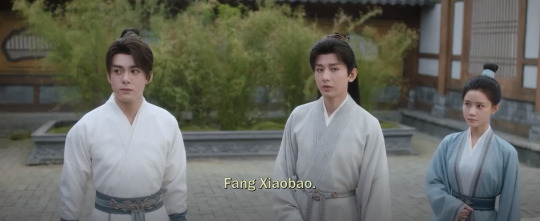
3. "Xiaobao" - Personally as a native Chinese speaker, LLH calling FDB "xiaobao" in front of everyone is a level of intimacy that genuinely would make me feel embarrassed to hear as a third party. 小宝 xiao bao (literal meaning = "little treasure") is usually something you call actual babies/children AND is FDB's family nickname for him, so if you're calling a grown man that in front of everyone including his colleagues, family and even strangers, then one might assume he is likely either your biological family or your romantic partner. (For comparison, just imagine calling your s/o their parent's special childhood nickname for them at work.)
4. Deleted lines where FDB calls LLH "xiaohua'er". 小花儿 Xiaohua'er ("little flower") is very intimate and feels like something someone might call a lover. Or, at least, definitely not a platonic shifu, even less so a parental figure. (For meta on the names that LLH & FDB use for one another, see forayuarchive's twitter thread.)
5. More deleted scenes (translated by forayuarchive on twitter), perhaps cut due to censorship, which make apparent LLH's high regard and deep care for FDB. For e.g., a line of internal monologue by LLH in ep 40, translated here by forhenjun, shows that LLH thinks of FDB as the only person in his two lifetimes who has always treated him as a human being rather than putting him on an unfair pedestal.
6. Official MLC accounts act like as if they ship them.
As murderedbyhomework mentioned, there is a song in the official soundtrack of MLC called "Fanghua's Day-to-Day Life" (yes, the exact same words as their ship name). Sounds like a couple's daily domestic life, doesn't it?

The official iQiYi Romance youtube channel lists clips of LLH & FDB under the romance category.
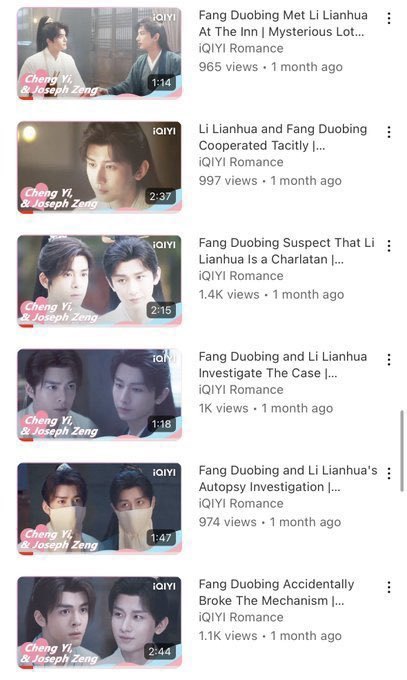
The official MLC douyin account posts MVs with emotional captions (e.g. this one translated here by forayuarchive) that emphasize how much both LLH and FDB mean to one another. Another official MLC douyin calls LLH & FDB the person each other trusts the most.
The MLC clips posted by the official Guangdong TV weibo account also has captions such as these (translated by rice_jpg) that straight up describe FDB's feelings towards LLH as "when you like someone" (very similar CN phrasing as the phrasing used to describe romantic crushes).
7. They are subtly paralleled with a canon straight romantic couple (see fanqxiaobao's twitter thread on the parallels btwn LXY/QWM scenes and certain LLH/FDB scenes). MLC also made a distinct change from the novel by not having FDB get married to Princess Zhaoling, even though the drama could have easily given FDB a romance with her.
8. If you're familiar with chinese romantic tropes or the danmei genre, LLH & FDB fit many common romantic tropes e.g. sharing a drink on the rooftop under the moonlight, forgotten first meeting in childhood (and then meeting again properly as adults), power couple fighting side by side (they even held hands!), nianxia, protective younger ml, sickly older mc - just to name a few. Danmei even has many stories of shizun/shifu & disciple pairings who fall in love as adult equals.
There's honestly lots more but these are just some off the top of my head. Again everyone is free to interpret anything! This is just me explaining why as a native chinese speaker I personally did not read their dynamic as that of a father and son.
#莲花楼#mysterious lotus casebook#li lianhua#fang duobing#fanghua#mlc meta#ik i alr made a post abt this but i just wanted to compile everything tgth in one post for my own ref too#full credit to the ops of the sources linked for the translations and meta!!#let me be very clear this is not me telling anyone to ship fanghua!! everyone is free to do/not do whatever they want; fandom is free#and to clarify this is not against feihua/ot3 at all; i multiship too#this post is solely about the 'fdb is llh's son' take#just explaining why shipping them is a valid interpretation given certain nuances in their portrayal
250 notes
·
View notes
Text
alright, so there's one outfit of li xiangyi's that i have questions about and which stands out to me, and it's his robes in the flashback with zhan yunfei.
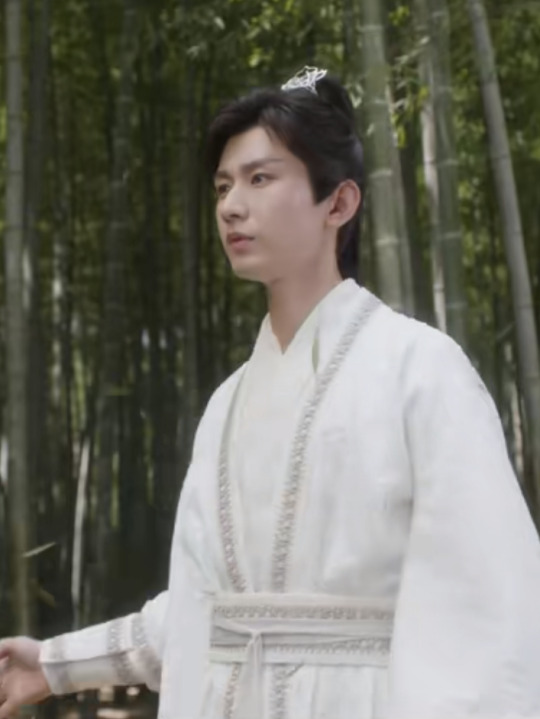
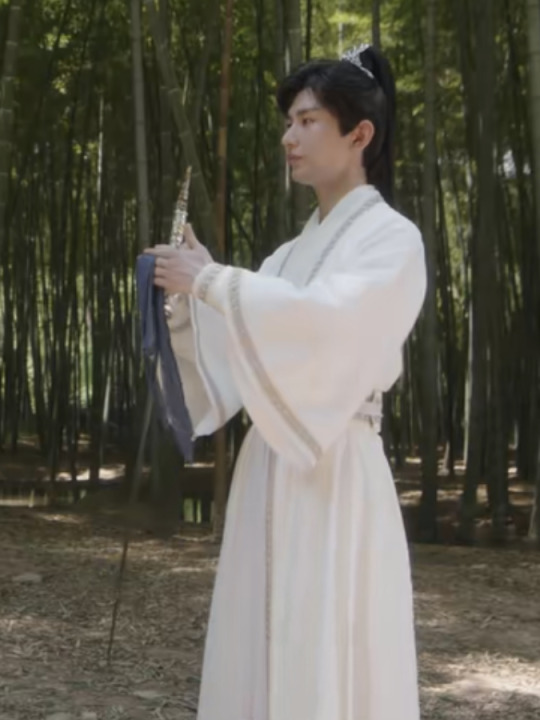

(bear with my screenshots, sorry. things in this scene move very fast and it was more difficult to get decent captures)
in the vast majority of his flashbacks, li xiangyi is in his red or white robes, which we generally associate with his status as leader of sigumen. they're the robes he's immortalized in in his portrait as baichuanyuan, the ones he wears at donghai, in his memories with qiao wanmian, etc. those outfits have a common silhouette, with the long, draping sleeves that fall open from the shoulders (apologies, i don't know the technical term). i don't have to post them here; we all know what they look like.
these robes are an exception to that. they're less elaborate, in different colours/accents plus in a different style, and it makes me wonder if his time with zhan yunfei took place before. before sigumen, before becoming 天下第一, when he was more of a wandering xia still building up a reputation for himself. not li xiangyi the legend but just a disciple, come down from his master's mountain to do his best for the jianghu. it would make sense, i think; no one else is in that clearing aside from zhan yunfei, himself, and the man they were trying to capture. there's no power of a sect involved here, and li lianhua doesn't mention working with one (just that "zhan yunfei teamed up with others") as he retells the story to fang duobing. this outfit certainly gives him more of a boyish feeling, less so a sense of being a leader or a representative hero of the jianghu. which brings me to my other point.
you know whose image li xiangyi is very closely evoking in this memory?


that styling in the zhan yunfei flashback specifically is the closest that li xiangyi and fang duobing have ever visually mirrored one another (beyond fang duobing generally wearing his hair like li xiangyi, which other people have brought up before). i chose these outfits of fang duobing's from the yucheng and yipin tomb arcs for comparison, as li xiangyi's outfit has the most direct resemblance to them down to smaller details like the belt ties, but fang duobing wears robes cut like this (with varying embellishments) a lot. this show is very deliberate about characters' distinct silhouettes, something i've mentioned before. i very sincerely doubt this similarity wasn't intentional.
why dress li xiangyi like this in this memory specifically? i don't know. perhaps it's because li xiangyi and zhan yunfei, too, are linked by an upheld promise over ten years the way fang duobing is to li xiangyi. perhaps it's to situate li xiangyi's age, remembering that he, too, was once at the same point of his life as fang xiaobao is now, earnest and still working his way to the top in the jianghu, however short and/or since forgotten that time was. perhaps it's simply that li lianhua, given that this flashback is told from his point of view, truly has come to see fang duobing in his younger self gone by. regardless of the reason, i think it's a fascinating parallel, and i once again wish we had more context for the past and period of time spent with li xiangyi and zhan yunfei together.
#im so sorry guys im so long winded sigh#but i realized this a little while back and then didn't know what to do about it#btw i think there might? be one more flashback where lxy wears robes like this but i can't remember where it is#in which case i'll have to factor that into this point but for now i just needed to scream about what i do know#mysterious lotus casebook#li xiangyi#fang duobing#zhan yunfei#zhanhua#(tangentially)#mlc meta#ashton originals#mlc costume meta
114 notes
·
View notes
Text
If episode 30 of mysterious lotus casebook is like multiple stabs to the heart, episode 31 is like. A gentle wiping of the blood from your face, a tender caress of the knife as it's lovingly guided deeper and deeper into your soul until it pierces your very being. Because Fang Duobing finds Shan Gudao's box of knicknacks, and he and Li Lianhua share a smile -- Fang Duobing's beaming, Li Lianhua's soft, reminiscing. And they find the knife that Li Xiangyi meticulously crafted for his shixiong, but it's broken -- and Li Lianhua unthinkingly points out that he wasn't very good at making weapons, so it's his fault that the knife broke after a few uses. But Fang Duobing, sweet, smart Fang Duobing, says that's not right -- the knife was purposefully snapped. It's not Li Lianhua's fault.
And it just got me thinking about how Li Lianhua is so quick to blame himself for everything. The knife breaking was his fault -- but really it was Shan Gudao who broke it. Li Lianhua's shifu's death was his fault -- but really it was Shan Gudao, again. Shan Gudao, who Li Lianhua adored, respected, loved, and crafted his entire life around (we also learn that Li Xiangyi / Lianhua's love for candy came from Shan Gudao).
Then we see Li Xiangyi's name maliciously struck out at the bottom of Shan Gudao's box, and the moment of realization for Li Lianhua is just... I need to lie down for 7-10 business years or maybe forever
#i am chewing glass over him#it's sad li lianhua hours#mysterious lotus casebook#li lianhua#li xiangyi#fang duobing#shan gudao#mlc meta#sort of#I'm just ranting my feelings as I rewatch
82 notes
·
View notes
Text




I am once again thinking about Di Feisheng.
I'm thinking about his outfits decorated in divine beasts and his associations with forces of nature, with wind and water.
I'm thinking about this outfit, and this moment.
I'm thinking about the legend of the carp that crests the waterfall and becomes a dragon in the skies.
#i just *clenches fist* love him so much#and his outfits and his little beastie hairpin#di feisheng#mlc meta#mysterious lotus casebook#costume appreciation
95 notes
·
View notes